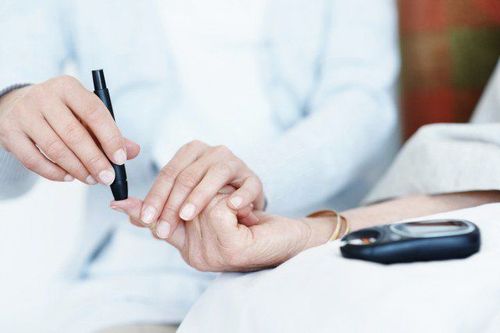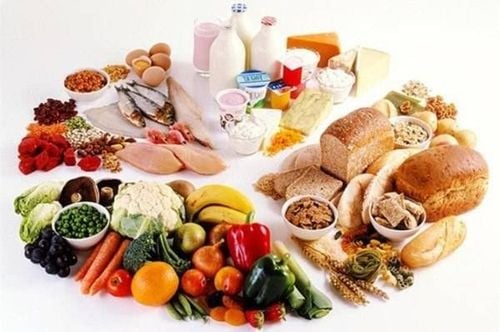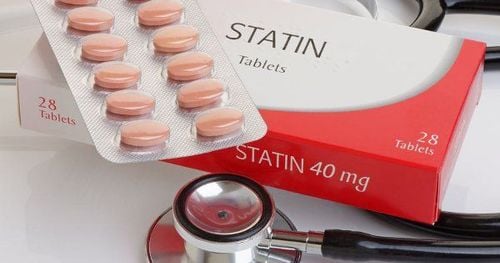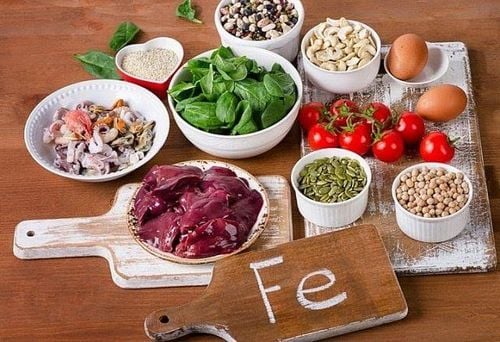This is an automatically translated article.
What should you eat if you have diabetes? This can be a difficult question for many people because your goal is to control blood sugar. A healthy diet can help prevent diabetes complications like heart disease. The following article will provide information on the 16 best foods to control your diabetes.1. What are the best foods for people with diabetes?
Living with diabetes doesn't mean you have to abstain from everything. You can still learn to balance meals and make healthy food choices while still eating the foods you love.Both sugary and starchy carbohydrates can raise blood sugar, but people can choose to include these foods in the right portions as part of a balanced menu. For people with diabetes, the most important thing is to monitor the amount of carbohydrates in a meal. Carbohydrate needs will vary based on many factors, including your activity level and the medications you take, such as insulin medications.
Dietitians can recommend specific carbohydrate guidelines to best meet a person's needs. As a general rule, however, people should try to follow the Academy of Nutrition and Dietetics' MyPlate guidelines: Consume no more than 1/4 of a plate of carbs in a single meal.
According to the American Diabetes Association (ADA), for people with diabetes, the key to a healthy diet is as follows:
Fruits and vegetables. Eat lean protein. Choose foods with less sugar. Avoid trans fats.
2. 16 best foods for diabetes control
2.1. Fatty Fish Many people consider fatty fish to be one of the healthiest foods on the planet. Fatty fish is an excellent source of omega-3 fatty acids, which primarily have benefits for heart health. Getting enough of these fats on a regular basis is especially important for people with diabetes, who have a higher risk of metabolic heart disease and stroke. DHA and EPA work to protect the cells that line your blood vessels, reduce markers of inflammation, and may help improve the way your arteries work.Everyone, not just people with diabetes, need a certain amount of healthy fats to keep the body functioning and promote heart and brain health.
The ADA report states that a diet high in polyunsaturated and monounsaturated fats can improve blood sugar and blood lipid control in people with diabetes.
Salmon, sardines, herring, anchovies, mackerel are typical fatty fish and are rich sources of polyunsaturated and monounsaturated fats. People can also eat seaweed; such as kelp and spirulina, as alternative plant sources of these fatty acids.
Fish is also an excellent source of high-quality protein, which helps you feel full and helps stabilize blood sugar. Instead of fried fish containing saturated fat and trans fat, people can try grilled, roasted or steamed fish. You can also combine fish with a mix of vegetables for a healthy meal option.
2.2. Green Leafy Vegetables Green leafy vegetables are full of essential vitamins, minerals and nutrients.
Green vegetables are very low in digestible calories or carbs, so they won't significantly affect blood sugar levels.
Spinach, kale, cabbage are the main sources of potassium, vitamin A, vitamin C and calcium from plants. They also provide plenty of protein and fiber.
Some researchers say that eating green leafy vegetables is helpful for people with diabetes due to their high antioxidant content and starch-digesting enzymes.
In a small study, subjects were given 300ml of kale juice daily for 6 weeks and found that kale juice can help regulate blood sugar and improve blood pressure in patients with subclinical hypertension.
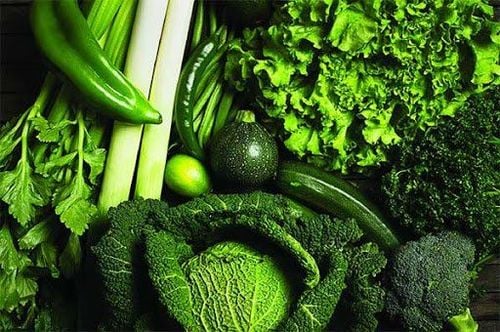
Rau lá xanh là một trong những thực phẩm tốt để kiểm soát bệnh tiểu đường
People can eat green leafy vegetables in their diet in salads, side dishes, soups or in combination with other foods. Pair them with a lean protein source, such as chicken or tofu for healthy meals.
2.3. Avocados Avocados have less than 1 gram of sugar, are low in carbohydrates but high in fiber and healthy fats, so you don't have to worry about them raising your blood sugar.
Daily avocado consumption has also been linked to improved overall diet quality and significant reductions in body weight and body mass index (BMI).
A 2019 study in mice showed that avocatin B (AvoB), a fat molecule found only in avocados, inhibited incomplete oxidation in skeletal muscle and the pancreas, reducing insulin resistance.
2.4. Eggs In fact, eggs bring a lot of benefits to your health. Eating eggs regularly may reduce your risk of heart disease in a number of different ways.
Eggs work to reduce inflammation, improve insulin sensitivity, increase levels of HDL (good) cholesterol, and modify the size and shape of LDL (bad) cholesterol.
A recent study found that eating a low-fat, low-carb breakfast with eggs can help people with diabetes control blood sugar throughout the day.
A more recent review found that consuming 6 to 12 eggs per week as part of a nutritious diet does not increase heart disease risk factors in people with diabetes. In addition, eggs are a good source of lutein and zeaxanthin, antioxidants that help protect against eye diseases.
You should eat the whole egg instead of just the white or the yolk. The benefits of eggs are mainly due to the nutrients found in the yolk rather than the white.
2.5. Chia seeds This is considered a great food for patients with diabetes. Chia seeds are extremely high in fiber but low in digestible carbs.
In fact, 11 of the 12 grams of carbs in a 28-gram serving of chia seeds are fiber, which doesn't raise blood sugar
Chia seed mucilage can actually lower your blood sugar by making slow the rate at which food moves through your intestines and the absorption of food.
Chia seeds can help you achieve a healthy weight because fiber reduces hunger, making you feel fuller for longer.
A study involving 77 adults who were obese or overweight and diagnosed with type 2 diabetes found that consuming chia seeds supported weight loss and helped maintain good glycemic control.
A few other benefits of chia seeds are known to help reduce blood pressure and markers of inflammation.
2.6. Legumes Beans are cheap but extremely nutritious, worthy of a superfood for your health. They are a great source of plant-based protein and can satisfy cravings and help people reduce their carbohydrate intake.
Beans also belong to the group of low glycemic index foods that are better for blood sugar regulation than many other starchy foods.
Beans help control blood sugar as it is a complex carbohydrate. Therefore, the body digests them more slowly than other carbohydrates.
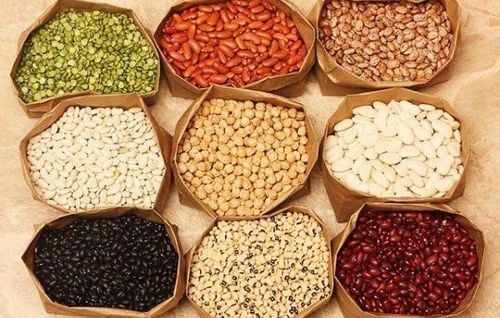
Đậu là thực phẩm kiểm soát bệnh tiểu đường tốt mà lại vô cùng dễ tìm kiếm
Lentils, black beans, lentils, atduki beans are options for diabetics. These beans contain nutrients such as iron, potassium and magnesium.
Beans are a very versatile food option in terms of preparation. You can boil, stew, make soup, or make toppings for cakes. When using canned beans, be sure to check the label so you don't choose one with added salt. Otherwise, drain and rinse the beans to remove any salt.
2.7. Greek yogurt Several studies suggest that eating certain dairy products like yogurt may improve blood sugar management and reduce heart disease risk factors, perhaps in part due to yeast. It contains microorganisms.
Probiotics are helpful bacteria that live in the human gut that help improve the digestive tract and overall health. Some studies from 2011 suggest that eating probiotic yogurt can improve cholesterol levels in people with type 2 diabetes, while also helping to reduce the risk of heart disease.
One review study found that consuming probiotic foods can reduce inflammation and oxidative stress, as well as increase insulin sensitivity.
The high levels of calcium, protein and a special type of fat called conjugated linoleic acid (CLA) found in yogurt can help reduce your appetite, making it easier to resist unhealthy foods. healthy. What's more, Greek yogurt contains only 6-8 grams of carbs per serving, which is lower than regular yogurt. You can add berries or nuts to yogurt to enjoy.
2.8. Nuts (seeds) Studies have confirmed all nuts contain fiber and are low in net carbs, although some are more than others.
Here are the digestible carbs per 28 grams of nuts, according to the United States Department of Agriculture:
Almonds: 2.6 grams. Brazil nuts: 1.4 grams. Cashews: 7.7 grams. Hazelnuts: 2 grams. Macadamia: 1.5 grams. Pecans: 1.2 grams. Pistachios: 5 grams. Walnuts: 2 grams. Research on different types of nuts has shown that regular nut consumption can reduce inflammation and lower blood sugar, HbA1c (which represents 3 months of blood sugar) and LDL (bad) cholesterol levels.
Another effect of nuts is that it can help diabetics improve their heart health.
A large 2019 study of more than 16,000 participants all with type 2 diabetes found that: Eating tree nuts - such as walnuts, almonds, hazelnuts and pistachios - made reduce the risk of heart disease and death.
Studies have also shown that nuts can improve blood sugar levels. One study in subjects with type 2 diabetes found that daily consumption of walnut oil improved blood glucose levels.
This finding is important because patients with type 2 diabetes often have high insulin levels and are associated with obesity.
2.9. Broccoli This is considered one of the most nutritious vegetables.
One cup of cooked broccoli contains just 54 calories and 6 grams of digestible carbs, along with important nutrients like vitamin C and magnesium.
Scientists conducted trials in people with diabetes and found that eating broccoli sprouts can help lower insulin levels and protect against cell damage.
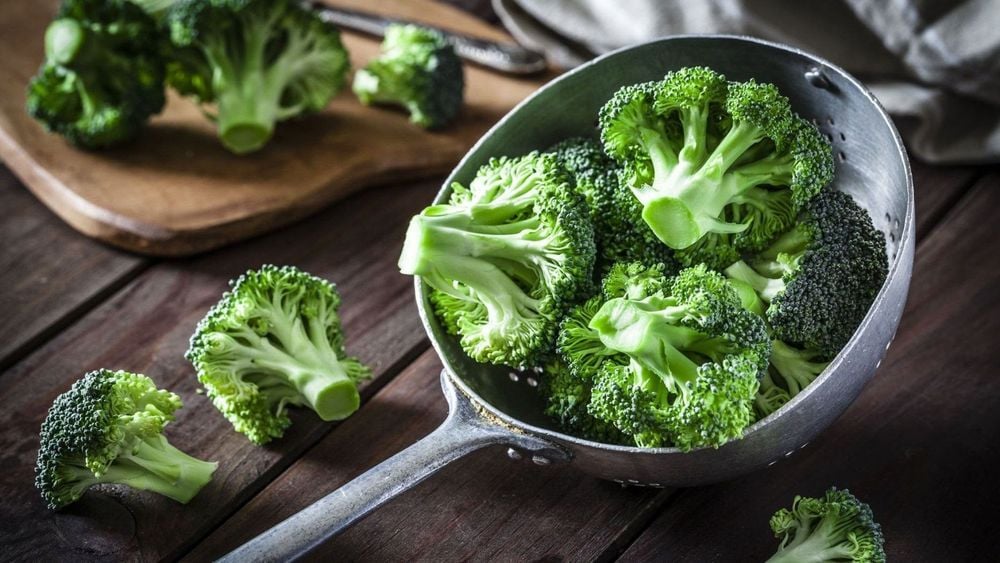
Bông cải xanh không chỉ giúp kiểm soát bệnh tiểu đường mà còn cải thiện sức khỏe mắt
Another study found that eating broccoli sprouts regularly in the daily diet reduced blood glucose levels by 10% in people with diabetes. This drop in blood glucose levels could be due to sulforaphane, a chemical found in cruciferous vegetables like broccoli and sprouts.
In addition, broccoli is another good source of lutein and zeaxanthin. These important antioxidants can help prevent eye diseases.
2.10. Extra virgin olive oil Extra virgin olive oil is extremely good for heart health. It contains oleic acid, a monounsaturated fat that has been shown to improve glycemic control, reduce fasting and postprandial triglyceride levels, and has antioxidant properties.
This is important because people with diabetes tend to have trouble controlling blood sugar and have high triglyceride levels. Oleic acid can also stimulate the fullness hormone GLP-1.
Olive oil also contains antioxidants called polyphenols. Polyphenols reduce inflammation, protect the cells that line your blood vessels, keep your LDL (bad) cholesterol from being damaged by oxidation, and lower blood pressure.
Extra virgin olive oil is unrefined, so it retains the antioxidants and other properties that make it so healthy.
2.11. Flaxseed This is considered an extremely healthy food for people with diabetes. They are high in heart-healthy Omega-3 fats, fiber, and other unique plant compounds. Some of their insoluble fiber is made up of lignans, which may help reduce the risk of heart disease and improve blood sugar control.
A study involving participants with prediabetes found that daily consumption of flaxseed meal reduced blood pressure - but it did not improve glycemic control or insulin resistance. Another study found that flaxseeds may help reduce the risk of stroke and potentially reduce the dose of medication needed to prevent blood clots.
Overall, flaxseeds are beneficial for your gut and heart health. Plus, flaxseeds are rich in viscous fiber, which improves gut health, increases insulin sensitivity, and feels full.
2.12. Apple Cider Vinegar Although made from apples, the sugar in the fruit, after being fermented into acetic acid, contains less than 1 gram of carbs per tablespoon.
According to a meta-analysis of 6 studies, including 317 patients with type 2 diabetes, apple cider vinegar has beneficial effects on fasting blood sugar and HbA1c. It can also reduce blood sugar response by up to 20% when consumed along with meals containing carbs.
Apple cider vinegar is believed to have many other beneficial health properties, including antibacterial and antioxidant effects. However, we still need more research to confirm its health benefits. To incorporate apple cider vinegar into your diet, start with 1 teaspoon mixed in a glass of water per day. Gradually increase to a maximum of 2 tablespoons per day.
2.13. Strawberries Strawberries are a delicious and nutritious berry. Anthocyanins are the antioxidant compounds abundant in strawberries that give them their red color. Anthocyanins have been shown to reduce cholesterol and insulin levels after meals. They also improve blood sugar and heart disease risk factors for people with type 2 diabetes.
Plus, strawberries contain polyphenols, which are beneficial plant compounds with antioxidant properties. A 2017 study found that consuming a polyphenol antioxidant compound from strawberries and cranberries for 6 consecutive weeks improved insulin sensitivity in overweight and obese adults without diabetes. Street. This is important because low insulin sensitivity can cause your blood sugar to become too high.
A 1-cup serving of strawberries contains about 46 calories and 11 grams of carbs, 3 of which are fiber. This serving also provides over 100% of the RDI for vitamin C, providing additional anti-inflammatory benefits for heart health.
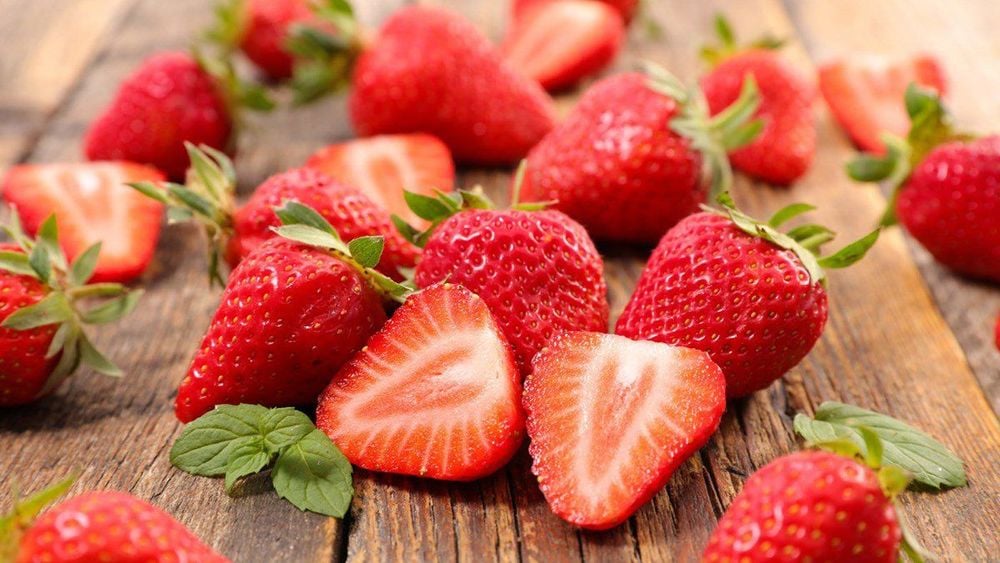
Dâu tây là loại quả mọng bổ dưỡng, rất tốt trong việc kiểm soát bệnh tiểu đường
One clove (3 grams) of raw garlic, which has about 4 calories, contains:
Manganese: 2% of the Daily Value (DV). Vitamin B6: 2% DV. Vitamin C: 1% DV. Selenium: 1% DV. Fiber: 0.06 grams. Research indicates that garlic contributes to improved blood sugar management and may help regulate cholesterol levels.
Other studies have also shown that garlic can help lower blood pressure and regulate cholesterol levels. If you can eat garlic then it is really a perfect choice to improve your diabetes.
2.15. Pumpkin One of the best vegetables for you is squash. They come in many varieties and most of them have the same good nutritional value, some with a superior nutritional value.
This fruit with thick flesh contains quite a few calories and low glycemic index.
Winter squash has a hard shell like a pumpkin. Summer squash such as zucchini, zucchini with soft skin are edible. Like most vegetables, squash contains beneficial antioxidants. Pumpkin also has less sugar than sweet potatoes, making it a great substitute.
Research shows that polysaccharides in pumpkin improve insulin tolerance and lower blood sugar levels in rats.
Although there are very few human studies, one small human study found that squash quickly and effectively reduced high blood sugar in people with diabetes who were seriously ill.
With the benefits it brings to you, this is an ideal supplement for each of your meals.
2.16. Shirataki Noodles Shirataki noodles are good for diabetes and weight management. The fiber-rich glucomannan noodles are extracted from the roots of the konjac plant, a plant grown in Japan that is processed into noodles or rice.
Glucomannan is a viscous fiber that helps you feel fuller for longer. Furthermore, it has been shown to lower blood sugar levels after eating and improve heart disease risk factors in people with diabetes and metabolic syndrome.
In one study, glucomannan significantly reduced fasting blood glucose, serum insulin, and cholesterol levels in diabetic rats.
100 grams of shirataki noodles also contain only 3 grams of digestible carbs and only 10 calories per serving.
These noodles are usually packaged in a liquid with a fishy smell, which you need to wash thoroughly before using. Then cook the noodles for a few minutes over high heat without adding any grease.
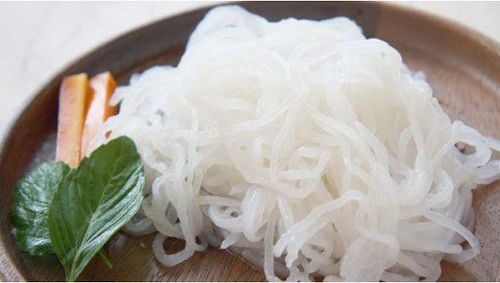
Mì Shirataki giúp bạn kiểm soát bệnh tiểu đường và cân nặng hợp lí
3. What foods diabetics should avoid
Balancing high and low glycemic index foods is one way to control diabetes. Foods with a high GI raise blood sugar more than foods with a low GI.When choosing foods with a high glycemic index of foods, limit portions and combine these foods with protein or healthy fats to reduce the impact on blood sugar and feel fuller for longer.
Foods with a high glycemic index of foods :
White bread. Rice. White pasta. White potatoes. Pumpkin. Popcorn. Melon. Pineapple. At the same time, diabetics should also limit their intake of salt, alcohol, refined sugar, soft drinks,...
When your blood sugar is not well controlled, it will increase your risk of certain diseases. serious illness. When you eat foods that help control blood sugar, insulin levels and inflammation are kept to a minimum, helping to prevent complications. Just keep in mind that, while these foods can help control blood sugar, the single most important factor in blood sugar management is following a nutritious, well-balanced diet. overall. Get regular medical check-ups to check your blood sugar.
General health check at Vinmec is completely different from normal health check, each health check package is scientifically and practically designed to approach the purpose of each examination package:
Early detection of diseases , combine treatment interventions for patients in the most comprehensive way. Helps in early screening of dangerous diseases, such as cardiovascular disease, metabolic disease, cancer. A team of specialists, experienced in diagnosis, consultation and comprehensive treatment combination. The system of advanced equipment meets standards, helping to evaluate and give accurate diagnosis. The test system meets international standards (reaching ISO 15189). At Vinmec hospital, in addition to the general health check, there are also many different health checkup packages to suit the purposes of medical examination and screening such as:
Standard general health checkup package. Special general health checkup package. VIP general health checkup package.
Please dial HOTLINE for more information or register for an appointment HERE. Download MyVinmec app to make appointments faster and to manage your bookings easily.
Reference articles: medicalnewstoday.com, healthline.com



